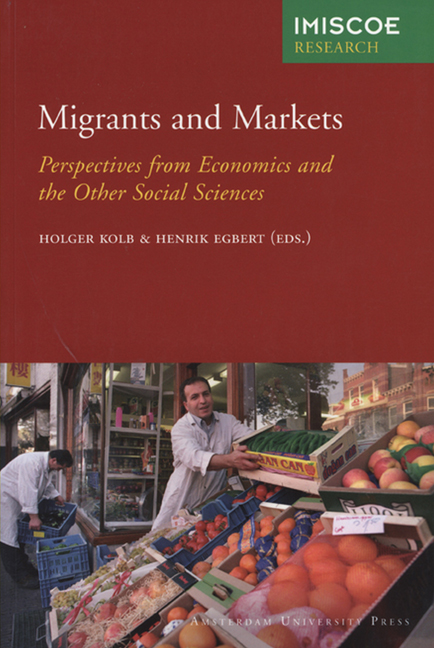Book contents
- Frontmatter
- Contents
- Introduction: Migrants and Markets: Perspectives from Economics and the Other Social Sciences
- The Impact of Immigration on the Labour Market: A Survey
- Investigating the Economic Impact of Immigration on the Host Country: The Case of Norway
- The Exit Option of Labour Migration from East to West Germany: Individual and Contextual Determinants of Unemployed Workers’ Geographic Mobility
- How Recent Amendments in German Immigration Law Affect Decisions: The Case of Polish Doctors
- Educational Selectivity and Labour Market Attainment of Jewish Immigrants from the Former Soviet Union in Israel and Germany in the 1990s
- States as Clubs? The Political Economy of State Membership
- Chinese Student Migration in Europe: A Migration That Nobody Objects To?
- Assessing Interdependencies between Sector Structures and Labour Migration: A Comparative Study of the British and the German Health Sectors
- Workers’ Remittances and International Risk Sharing
- Skills and Remittances: The Case of Afghan, Egyptian and Serbian Immigrants in Germany
- The Impact of Migration on Foreign Trade in Bolivia
- List of Contributors
- Other IMISCOE Titles
Investigating the Economic Impact of Immigration on the Host Country: The Case of Norway
Published online by Cambridge University Press: 02 February 2021
- Frontmatter
- Contents
- Introduction: Migrants and Markets: Perspectives from Economics and the Other Social Sciences
- The Impact of Immigration on the Labour Market: A Survey
- Investigating the Economic Impact of Immigration on the Host Country: The Case of Norway
- The Exit Option of Labour Migration from East to West Germany: Individual and Contextual Determinants of Unemployed Workers’ Geographic Mobility
- How Recent Amendments in German Immigration Law Affect Decisions: The Case of Polish Doctors
- Educational Selectivity and Labour Market Attainment of Jewish Immigrants from the Former Soviet Union in Israel and Germany in the 1990s
- States as Clubs? The Political Economy of State Membership
- Chinese Student Migration in Europe: A Migration That Nobody Objects To?
- Assessing Interdependencies between Sector Structures and Labour Migration: A Comparative Study of the British and the German Health Sectors
- Workers’ Remittances and International Risk Sharing
- Skills and Remittances: The Case of Afghan, Egyptian and Serbian Immigrants in Germany
- The Impact of Migration on Foreign Trade in Bolivia
- List of Contributors
- Other IMISCOE Titles
Summary
Introduction
International migration and the role that it plays in the economies of the originating and receiving countries has frequently been a topic of interest. To our knowledge, such a study does not exist in the literature particularly for Norway. The present study aims at filling this gap in the literature through investigating the nature of the causal relationship between immigration and two macroeconomic indicators, GDP per capita and unemployment, using Granger causality tests based on Norwegian data during the period between 1983 and 2003.
Literature on the economic impact of immigration focuses primarily on the effects of immigration on the unemployment of domestic workers. Marr and Siklos (1994, 1995), Konya (2000), Akbari and DeVoretz (1992), Withers and Pope (1985), Winegarden and Khor (1991), Gross (1997), Marr (1973), and Altonji and Card (1991) studied how immigration affects the unemployment of domestic workers in various Western countries and found mixed results. The effects of immigration on the income of the host country citizens have also been widely investigated. Laryea (1998a, 1998b), Gruen (1986), Jolley (1971), Easton (1990), Grossman (1982), and Feridun (2004, 2005) have investigated the nature of the causal relationship between immigration and income in many countries using various econometric methods. Their results mostly showed that immigration has a positive impact on the income of the host country.
As is the case for many developed nations, Norway faces the challenges of an ageing population. The combination of the demographic effects of the baby booms that marked the immediate post war period, the fall in fertility rates that began from the late 1960s, and longer life expectancy have led to a very marked acceleration of the ageing process of the population in Norway. This has serious implications for the sustainability of the pension and benefit systems and for labour market equilibrium. With more elderly people and fewer young people, Norway is expected to experience a decline in the labour supply within the next few decades. This will have to be accompanied by an increasing number of people of foreign origin entering the labour market. Inflow of aliens into the country in the last decade has made immigration and immigration policy a major public issue in Norway.
- Type
- Chapter
- Information
- Migrants and MarketsPerspectives from Economics and the Other Social Sciences, pp. 46 - 55Publisher: Amsterdam University PressPrint publication year: 2008



